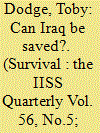| Srl | Item |
| 1 |
ID:
138595


|
|
|
|
|
| Summary/Abstract |
Policymakers, journalists and pundits have struggled to understand the seizure of Mosul by the Islamic State of Iraq and al-Sham (ISIS) on 10 June 2014, the group’s drive south towards Baghdad and the collapse of the Iraqi army in the face of its advance. The way in which this fast-moving crisis is perceived will determine the response of leaders in Iraq, the wider Middle East and across the international system. It will not only shape the initial military response to ISIS but, much more importantly, the formulation of longer-term policies that aim to tackle the underlying causes of the group’s rise and its seizure of territory in both Iraq and Syria.
|
|
|
|
|
|
|
|
|
|
|
|
|
|
|
|
| 2 |
ID:
110824


|
|
|
|
|
| Publication |
2012.
|
| Summary/Abstract |
This paper critically evaluates the popular representation of rural decision making in India as guided by socio-cultural dynamics and as a resort from various social alignments. It investigates how decisions get taken about a decentralized governance scheme in rural India, what variables impact these decisions - namely, social, political, administrative or economic - and how these variables impact the scheme performance. Case studies and empirical analysis of performance of a decentralized welfare scheme in India, the Andhra Pradesh Rural Employment Guarantee Scheme (APREGS), demonstrates significant influence of agriculture-based economic dynamics and administrative efficiency factors. Local social hierarchies and cultural complexities do not come as the main concerns. These results challenge the traditional understanding of rural dynamics as totally controlled by caste hierarchies and authority of the large land owners and are discussed in the light of the institutional rational choice framework proposed by Elinor Ostrom. The results also call for a fresh and wider debate of whether India is witnessing a longer term indirect developmental outcome of empowerment which actively started in 1993 with the recognition of local governance systems (Panchayati Raj) as a formal democratic body.
|
|
|
|
|
|
|
|
|
|
|
|
|
|
|
|